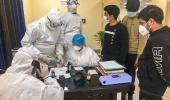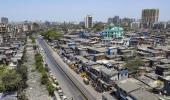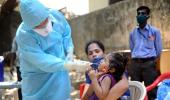'Our preparation is based on ICMR projections, whatever preparations we have to make.'
'If they project around 70,000 is the maximum number of hospital cases by mid-May or May 30, we are preparing accordingly -- how many people will need hospitalisation.'
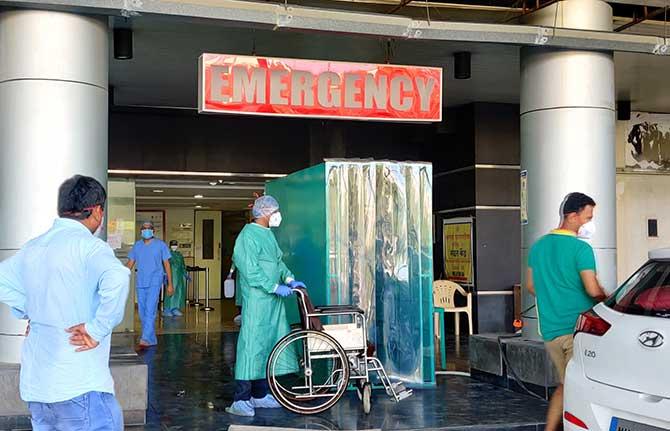
April 2020 was one of the busiest months for the Indian Administtraive Services officers who runs the megapolis of Mumbai.
Ever since the coronavirus crept into the city limits, perhaps some time in late February, IAS officers posted in Mumbai have had their work cut out for them.
The municipal commissioner and his team -- four additional municipal commissioners, many senior IAS officers on deputation, assisted by several deputy municipal commissioners and assistant commissioners, as well as the entire Municipal Corporation of Greater Mumbai -- has been working, ceaselessly, since March to protect the city from a further influx of the virus, control the spread of COVID-19 across the city and have the facilities to deal with the present expanding caseload of the virus-afflicted.
If that wasn't more than enough, the bigger task for these officers has been to prepare over-populated Mumbai for a post-lockdown scenario, when COVID-19 numbers might rise further, higher than they already have.
As of May 1, they stand at 7,812 cases and 295 deaths and it is the worst-affected city in the country.
That preparation has involved grappling with Mumbai's urban infrastructure to make sure, within the quickest possible time, there are enough beds, medical workforce, hospital ancillary staff and ambulances to cope with any possible surge in coronavirus cases.
Those numbers -- a target of 7,000 additional hospital beds for COVID-19 patients, over 3,000 more doctors and nurses, 40,000 corona care centre slots, ventilators, scores of ambulances -- have been ramped up as per Indian Council of Medical Research projections.
Dr Ramaswami Nallamuthu, 46, a 2004 IAS batch Maharashtra-cadre officer and native of Tamil Nadu, with a post-graduate veterinary degree, who has worked in Satara, Buldhana, Pune, Mumbai and Chiplun and was earlier municipal commissioner of Navi Mumbai, was appointed CEO of the Maharashtra Maritime Board last year.
But like most of the city and state's IAS officers, his role has been temporarily refashioned and he has been posted back to the BMC to help with the unfolding, tricky pandemic crisis.
Dr Ramaswami's long days are now all about huge feats of coordination.
With no time to think or ponder the gravity of the situation, he says quietly.
A lot of work happens on the telephone and via Zoom calls and conferences.
After this interview to Vaihayasi Pande Daniel/Rediff.com he had a Zoom meeting scheduled for 10.30 am.
His main responsibilities, currently, include administering the city's largest COVID-19 facility, the Seven Hills hospital, Andheri East, north west Mumbai, and working to strengthen and extend the city's medical manpower.
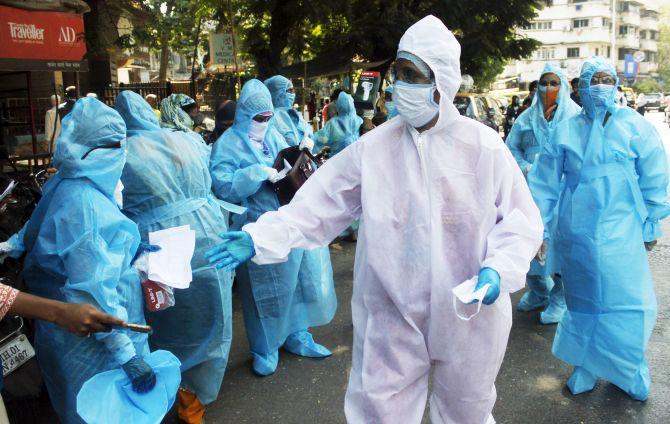
As an administrator, and somebody who has been the municipal commissioner of Navi Mumbai, how completely different are the challenges of working with COVID-19 for you?
What have been the biggest challenges?
It is unprecedented.
Not only for me. For anybody who is in administration. Or the medical field.
It is unprecedented and unpredictable.
It is a new path to travel on.
It's all learning, continuous learning. Learning from others. Learning from our own experience.
It is really challenging.
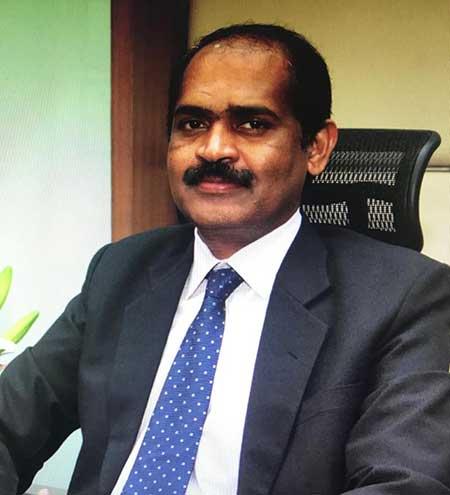 IMAGE: Dr Ramaswami Nallamuthu
IMAGE: Dr Ramaswami NallamuthuHas it been one of the most difficult challenges you have faced in your career?
Yes, definitely. Definitely.
For whoever is dealing with COVID-19 -- it's a very difficult task, whether at the state level, or government of India level, or maybe local level.
At whatever level for anybody handling these issues -- they are really challenging ones.
The challenge is in infrastructure, manpower and unpredictability.
And so many other things.
And the constantly evolving situation? That would be probably one of the biggest parts of the challenge. Is that correct?
Yes, of course. Of course.
You were transferred back to the BMC since your office at Maharashtra Maritime Board is closed post the lockdown. And one of your tasks is to help expand the city's medical manpower?
This is my deputation. I am still continuing in Maharashtra Maritime Board (eventually).
But for the last one month, since March 30th onwards, I'm working in the BMC.
I am fully devoting my time for this only, because this is more challenging.
My task is mainly for upgradation and maintenance of the Seven Hills hospital, then training of manpower and partly coordinating with the plasma therapy project.
These are the three main tasks.
Apart from that, there are other coordination issues. Many other issues that come up in the process of handling these things -- coordination with various agencies -- there are multiple tasks. These are the main issues.

You are working to expand the city's medical manpower. How are you going about it? How are you finding the people?
Basically, what we have done, so far, is to train the existing manpower.
So those who are in medical colleges, those who are in nursing colleges, those who are students and from other medical schemes.
They are all oriented (now) in handling COVID.
We formed a committee of the four deans of our medical colleges (Mumbai's municipal colleges: The Topiwala National Medical College, the Seth Gordhandas Sunderdas Medical College, the Lokmanya Tilak Municipal General Hospital And Medical College and the state government-run Grant Medical College) before preparing a syllabus for training these people -- doctors, nurses, and other staff.
We have trained more than 3,000 people so far.
This includes fourth year and fifth year MBBS students, interns, second year and third year nursing students. We have five nursing colleges under the BMC.
And other than that, the CPS doctors (College of Physicians and Surgeons at Parel, central Mumbai, that offers a variety of diplomas and fellowships), those who are doing a PG diploma and resident doctors also.
For example, we are using second year, third year nursing students; then almost 600 MBBS students, interns.
Almost 1,709 are resident doctors. Many of them are working. Now these forces are being used for many purposes.
If needed, we will train more people also, maybe dental students, dentists, other doctors from other streams, BAMS (bachelors of ayurvedic medicine and surgery), homeopathy and others also.
We are keeping that option also open; depending on need then we will train them too.
That would mean you have expanded Mumbai's medical manpower by about 3,000 people or so recently?
May not be that (exact) number.
May not (term it) expansion. Partly it is expansion.
Orientation is also important.
When you handle these kinds of (COVID-19) cases, self-protection is more important, right?
So, you cannot go and get yourself infected in a hospital.
This syllabi covers all these things and especially ICU management, now (working in) an ICU is the main thing in treating COVID-19 patients.
All these aspects are well covered, with latest updates from ICMR (the Indian Council of Medical Research) and other Internet courses also, and hands-on training for handling ventilators.
How long does the training take?
It is one full day, for everyone, morning to evening, run from our BMC Borivali (north west Mumbai) training institute.
Other resident doctors were trained in their respective medical colleges, where they have all the facilities.
It is a continuous process -- now, so far, we have covered more than 3,000 people.
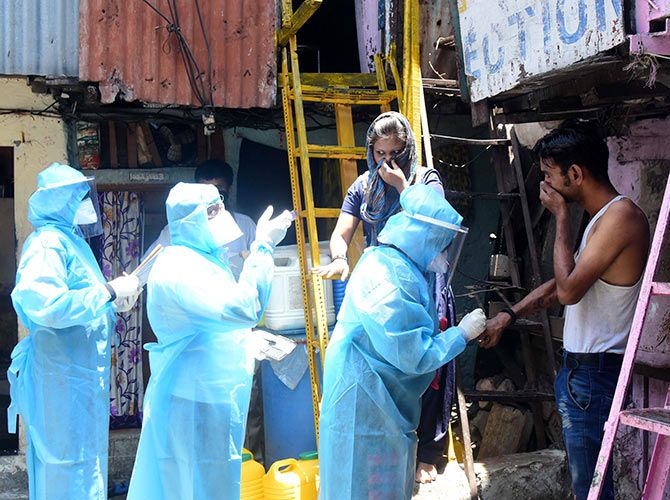
How responsive are these students?
Are there high levels of anxiety, as well, about having to handle COVID-19 patients?
No.
Mostly their trainers -- the deans and professors -- are from the medical colleges. So, they (the students) have that confidence in them.
Whatever natural anxiety, a normal person will have, will always be there.
PPE and other protective measures are there.
I think this (the risk) is part of the profession and, and everybody is up to the challenge.
People are eager to come forward and help.
Like it is their duty?
Yes, yes, definitely, definitely.
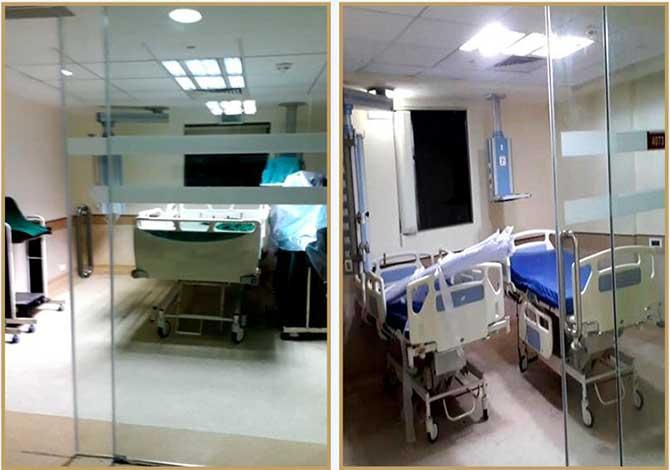
And as an administrator, because I understand Mumbai has a very high number of asymptomatic cases.
So as an administrator, how does that impact your job?
From your point of view, as an IAS officer, how does that change things?
Does that mean you have to look at expanding more manpower?
See, our preparation is based on the ICMR projections, whatever preparations we have to make.
For example, if they project around 70,000 is the maximum number of hospital cases by mid-May or May 30, we are preparing accordingly -- how many people will need hospitalisation, and accordingly the expansion plan is prepared by honorable MC Sir (Mumbai Municipal Commissioner Praveen Pardeshi), in consultation with the task force.
My major role is in Seven Hills, where we want to expand it to at least 1,300 beds.
Right now, we are updating 600 beds and in two to three days it will go up to 800.
We are expanding everything simultaneously.
Now we (Seven Hills) are handling the highest number of cases in Mumbai.
Are you also advising other hospitals, who are trying to expand bed capacity?
I believe Nair hospital is also trying to expand their capacity (to 1,600 beds)?
Yes.
I am there on the committee for Nair also.
Manisha Madam (Manisha Mhaiskar, former additional municipal commissioner health during Mumbai's H1N1 and malaria outbreaks, deputed to be protocol officer to oversee detection and isolation of COVID-19 cases) looks after that.
I too intervene, once in a while, if they ask for (help).
The dean is the same, Dr (Mohan) Joshi, for Seven Hills and Nair also. Nair is mainly looked after by Manisha Ma'am.
Since you had so much experience expanding Seven Hills, I thought maybe they would be consulting you for bed expansions elsewhere in Mumbai.
It's all exchange of ideas. We all work as a team. We learn from each other.
What are some of the shortages that the city can still face ahead and that you may be already planning for at Seven Hills? PPE, test kits, throat swabs and gloves etc?
(Shortages) were all in the initial stages.
Now, there is no issue of (shortage of) PPE or anything, because they are all in sufficient quantities.
In fact, all the drivers also are being given.
Ambulances have been expanded, that also I used to coordinate. We added more buses to transport non-symptomatic cases.
We are adding more. Our MC Sir had roped in Uber for transporting patients.
So many things happening simultaneously.
I think that there are no more shortages of PPE and other basic things, that are being offered to everyone who needs them, as per protocol.
I don't think any such shortages exist.
The only thing is that the beds we need expand.
That is happening simultaneously -- with GT hospital (Gokuldas Tejpal hospital), St George's (both in south Mumbai) have already been earmarked for more beds.
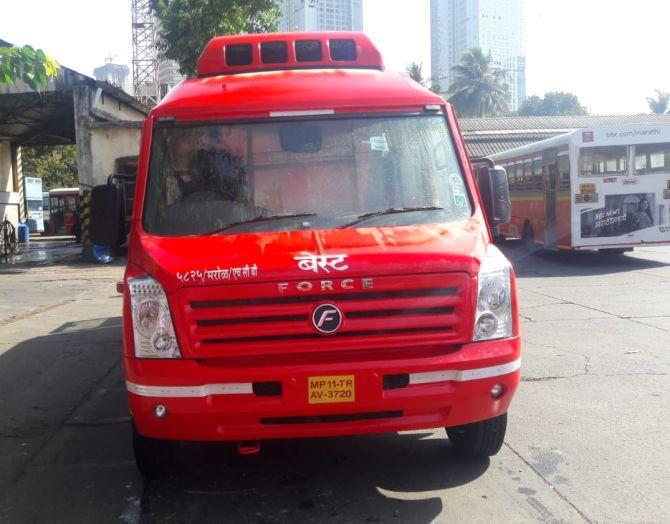
I saw pictures of those BEST mini buses that have been converted into ambulances.
You were also working on that project?
I coordinated with that. Actually, BEST MD Bagde Sir (Dr Surendra Kumar Bagde, managing director, BEST) is doing that.
When the work was allotted to various additional commissioners, then CSM Sir (Maharashtra Chief Secretary Ajoy Mehta) gave me this project of adding 50 more ambulances.
Accordingly, we have taken 15 buses from the MSRTC (Maharashtra State Road Transport Corporation) and 15 from BEST and remaining from the BEST are in the process. They are fully converted into ambulances by professional ambulance manufacturers with Rs 5 lakhs to Rs 6 lakhs worth of equipment also.
We need multiple types of vehicles. When we move people from slum areas to, for example, COVID-19 care centres, we need seated buses. When we shift patients, we need a proper ambulance.
MC Sir had roped in Uber also, where they could take especially non-COVID patients if they go for dialysis or for other things.
It's all a multi-pronged approach that is being done at the MCGM level. Control rooms are now handling all these kinds of ambulance issues.
At Seven Hills, whenever the lockdown does lift, what are some of the challenges that you think you will face as a as an administrator at Seven Hills?
See, there will be an exit policy.
I don't think in Mumbai, it will happen in a day.
That policy will be applicable to Seven Hills also.
In any case, in Seven Hills we are handling COVID-19 positive cases only.
Ours is a complete, total, COVID-19 facility.
We are already taking (steps), so there is nothing more to add.
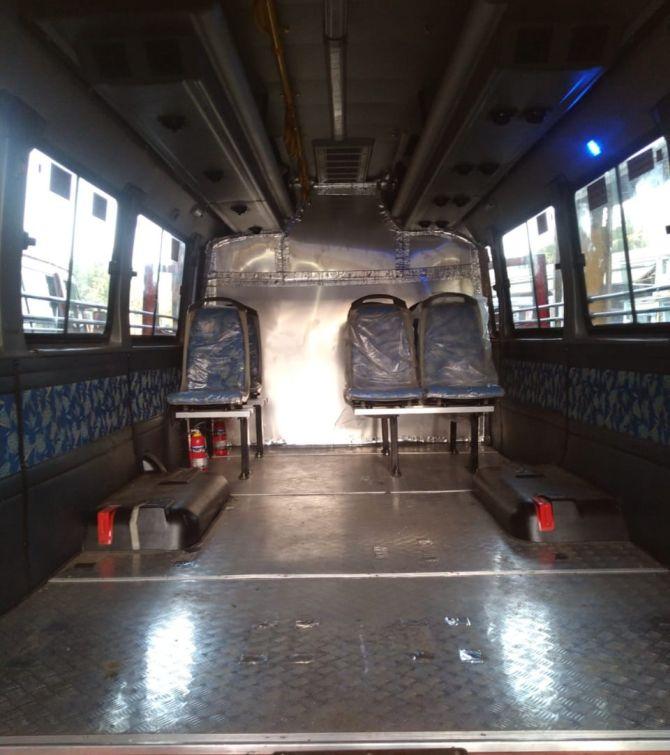
Apart from expanding medical manpower, the number of doctors and nurses, what about the need to expand ancillary staff, like technicians etc?
Yes.
That is also being done.
You are handling that?
Yes.
Especially for Seven Hills I am handling that.
We have trained a lot of dialysis technicians.
Because they are putting a lot of a dialysis patients over there.
We are planning to put at least 30 machines.
Already 20 are working there.
We need a lot of technicians and we have taken them on, on contract basis.
Even doctors and nurses, we are recruiting.
Housekeeping services also we are taking on in large numbers.
Mostly they are outsourced.
We have to simultaneously augment everything.
Not only doctors and nurses.
All our paramedics and technicians.
We keep expanding simultaneously.
You are working on the augmentation of ancillary staff mainly for Seven Hills.
Not for other hospitals?
That the BMC level administration is doing.
There are other additional commissioners who look after that.
Dialysis unit expansion, I coordinate.
Seven Hills is the largest facility.
That is why I put maximum energy in that.
In the plasma therapy project, what is your role exactly?
I coordinate with all these teams.
Dr Om Shrivastav (Jaslok and Kasturba Gandhi hospital), Dr Jayanthi Shastri (Nair hospital).
Sorting out issues.
For example, licenses from the Food and Drug Administration.
Various agencies.
Blood banks.
I am kind of coordinating.
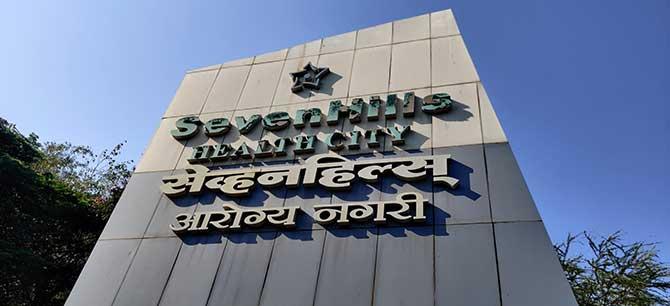
How long are your days?
What time do you begin and what time do you end?
Are they very stressful?
(Pauses) It generally depends.
All the days are not the same.
Sometimes it starts at 8, 8.30 am.
Phone calls start.
Zoom calls will be there.
Throughout the day I make at least 50 to 60 phone calls minimum, whether incoming or outgoing.
Continuous process.
And multiple issues.
I continue doing, no issues.
As the chief administrator in charge of Seven Hills what is it right now -- like today or tomorrow -- the biggest challenge you are facing at the hospital?
It is basically the speed with which we are expanding.
The kind of management we need.
In fact, we have put in a management agency also, consultants also.
They are working as a team.
The major challenge is the physical infrastructure (at the hospital) -- some incomplete work or some old work that needs to be repaired or negative pressure ventilation (used in treatment of acute respiratory distress syndrome) that has to be created.
All these things have to be done, in this critical situation, wherein the patients are already present -- it is an operating hospital.
Many issues. Labour issues.
From bringing people from outside.
From Navi Mumbai or Thane.
And you have to coordinate with all these people.
There are so many operational issues.
But as a team people are working really well and I am sure that we will be able to reach our target and serve the people.
You mentioned that you are going into video conference, so are you regularly asked for advice from others working at the MCGM.All of you are pooling your experiences and knowledge?
MC sir organises Zoom calls. Where on (different) issue participation will be there.
It is sharing of knowledge, completely.
I take Zoom calls for Seven Hills almost every day with my team.
In this situation, which you have been dealing with since March 30, has there been any moving or human experience that you encountered?
It is fluctuating.
Sometimes it is very, very satisfying.
Overwhelming.
(Choosing his words slowly) sometimes if we see some cases, for example the death of one BMC employee, then it keeps your mood down also.
It fluctuates.
It is a new situation to handle all these kinds of things.
But we don't have too much time to think (adds with a soft, bemused laugh).
